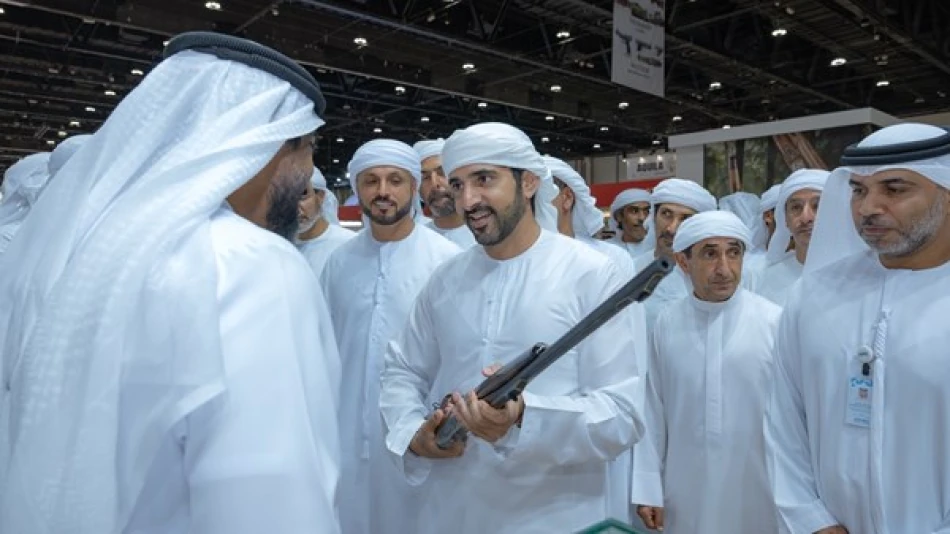
Dubai Crown Prince Visits Abu Dhabi International Hunting and Equestrian Exhibition 2025
UAE Crown Prince Champions Heritage Tourism as Abu Dhabi Hunting Expo Becomes Global Cultural Bridge
Dubai's Crown Prince Sheikh Hamdan bin Mohammed bin Rashid Al Maktoum positioned the UAE as a world leader in sustainable hunting and equestrian sports during his visit to the 22nd Abu Dhabi International Hunting and Equestrian Exhibition. His remarks signal the Emirates' strategic pivot toward heritage-based tourism and cultural diplomacy, leveraging traditional practices to strengthen international relationships while promoting environmental stewardship.
Strategic Vision Beyond Tourism
During his tour of the exhibition at Abu Dhabi National Exhibition Centre (ADNEC), Sheikh Hamdan emphasized that the event represents more than cultural celebration—it's a diplomatic tool. "This exhibition is an authentic Emirati message to the world that we are a nation that knows how to preserve its heritage and pass it to future generations with a modern spirit that preserves our identity," he stated.
This positioning aligns with broader Gulf strategies to diversify economies beyond oil dependency. The UAE has consistently invested in cultural tourism, following successful models from countries like Japan, which leveraged traditional arts for soft power projection, and Scotland, which transformed Highland games into international tourist attractions.
Economic Scale and Global Reach
The exhibition spans 92,000 square meters with participants from 68 countries, making it the largest gathering of its kind in the Middle East and North Africa region. This scale reflects the UAE's ability to create world-class events that attract international investment and tourism revenue.
Defense Industry Integration
Sheikh Hamdan's visit to the Caracal pavilion, part of the EDGE Group, highlights the exhibition's dual purpose. By showcasing Emirati light weapons and ammunition manufacturing alongside traditional hunting practices, the UAE demonstrates technological advancement while maintaining cultural authenticity. This integration mirrors Israel's success in combining military technology exhibitions with cultural events to attract international buyers and diplomatic partners.
Environmental Stewardship as Competitive Advantage
The Crown Prince's emphasis on sustainable hunting practices and wildlife protection positions the UAE ahead of regional competitors in the growing eco-tourism market. "Our efforts reflect the UAE's commitment to protecting the environment and wildlife, in line with our leadership's vision of sustainability," he noted.
This approach contrasts sharply with traditional hunting exhibitions that face increasing criticism from environmental groups. By proactively addressing sustainability concerns, the UAE creates a defensible market position as global attitudes toward wildlife conservation intensify.
Youth Engagement and Cultural Continuity
Sheikh Hamdan specifically praised young Emiratis' participation, recognizing their role in modernizing traditional practices. This generational bridge-building ensures cultural practices remain relevant while adapting to contemporary values—a challenge many Gulf states face as they balance modernization with tradition.
The "Al Maqnas" team's falconry demonstration, which Sheikh Hamdan observed, exemplifies this balance. Traditional hunting scenarios are presented with educational context, making ancient practices accessible to younger audiences and international visitors unfamiliar with Bedouin culture.
Regional Competition and Market Positioning
The exhibition's success comes as Gulf states compete intensely for tourism revenue and cultural influence. Saudi Arabia's NEOM project and Qatar's World Cup legacy create pressure for the UAE to maintain its position as the region's cultural and business hub.
By establishing the hunting and equestrian exhibition as a recurring international event, the UAE creates sustainable competitive advantages that are difficult for neighbors to replicate quickly. The 22-year history provides credibility and established relationships that newer initiatives cannot match.
Investment Implications and Future Growth
The exhibition's expansion suggests strong return on investment for cultural tourism initiatives. ADNEC's continued growth and the UAE Falconers' Club's involvement indicate government confidence in this sector's long-term viability.
For international investors, the UAE's approach offers lessons in creating authentic cultural experiences that generate revenue while building diplomatic relationships. The model could be replicated in other regions with strong traditional practices, from Central Asian horse cultures to African hunting traditions.
The exhibition runs through September 7, 2025, providing extended opportunities for international engagement and economic impact measurement that will likely influence future cultural tourism investments across the Gulf region.
Most Viewed News

 Layla Al Mansoori
Layla Al Mansoori






